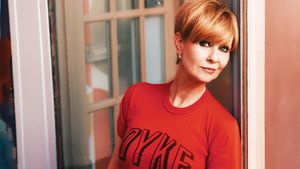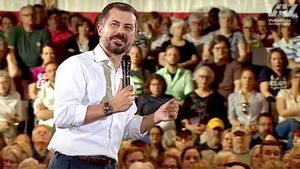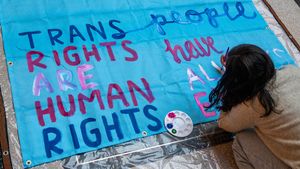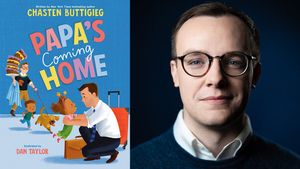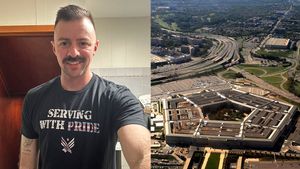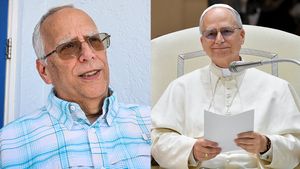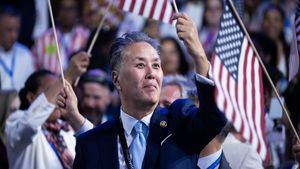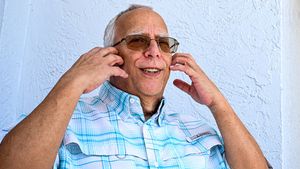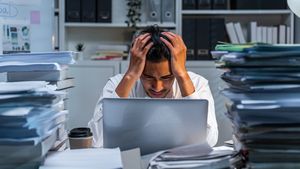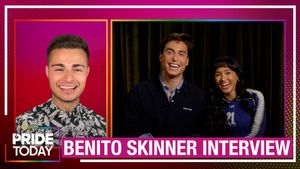Marissa Bode hopes Wicked inspired viewers to be "brave" in standing up for "what you know to be fair and just." And that includes equality for LGBTQ+ and disabled folks.
The Out100 honoree — who plays Nessarose, sister of Elphaba, in the Ozian blockbuster — opened up about the impact of the film, and how representation has allowed her to feel empowered to come out and be a possibility for others. That includes a world that is safer for relationships like hers — the queer, biracial, disabled actress has dated Lauren Brooks since September 2023.
"I can’t wait for the day where I can feel safe and proud to hold my girlfriend’s hand in public no matter what side of town we’re on or what state we’re in," she says. "I hope this movie helps people remember that so much progress can be made by individuals simply speaking up for what they know is right."
Bode has emerged as a strong advocate for marginalized folks since the film's release; she recently slammed the "gross and harmful jokes" about the disability of her character, who like Bode uses a wheelchair.
"The disabled community doesn’t want pity for living in a world that wasn’t built for us, but we do want to share the same rights and freedoms that are available to our non-disabled peers," she tells Out. "When navigating the flaws in our system, the one thing that keeps my flame burning is the disabled community around me. I have so much love for this community that I am so connected to and for those members who aren’t afraid to be loud about what we need and deserve."
See the full Out100 Q&A with Bode, who was honored this year by Out for her LGBTQ+ cultural impact, below.
What do you hope is the takeaway from Wicked (and the LGBTQ+ visibility you bring to it)?
One of the main themes in Wicked that I hold very close to my own heart is speaking up for what you know is right. I hope others will watch the film and feel empowered to live by the idea that you can actually change the world if you are brave enough to stand up for what you believe in and what you know to be fair and just. LGBTQ+ rights have been a huge target within U.S. legislation. As a country, we have made great strides, but there is still a lot more work to be done and many more minds to open — an alarming amount of people would still rather see a child in deep depression or dead than have that child living as their authentic self. I can’t wait for the day where I can feel safe and proud to hold my girlfriend’s hand in public no matter what side of town we’re on or what state we’re in. I hope this movie helps people remember that so much progress can be made by individuals simply speaking up for what they know is right.
What was the accomplishment you were most proud of this year?
I’m very proud that I have leaned into my queerness and been more unapologetic about it this past year. It took me 20 years to openly acknowledge my queerness to the people I am closest to, even though internally I have always known who I am and who I am attracted to. I grew up in a small town in the Midwest and though I love a lot of the community there, not everyone was or is accepting of queerness. On top of being one of a very, very few people of color at my school and having a physical disability, admitting queerness was just one more thing to make me feel “othered.” So I hid it. Upon graduating high school, a few of my peers came out publicly. Which was one of the reasons I was emboldened to come out as well. This is why representation is so important, it helps others feel less alone.
What was the largest obstacle you faced – and how did you overcome it?
The largest obstacle I’ve ever had to face is one that I’ve continued to face since becoming physically disabled at age 11. However, my disability itself isn’t the obstacle nor is it something I need to overcome. My disability is a part of who I am. The real obstacle I continue to face is inaccessibility and living in an ableist system. The amount of spaces I’ve been in that claim to be inclusive or have an “all are welcome” sticker in their window but have stairs to get inside… it’s exhausting. The most frustrating aspect of this challenge is when we express our need for these basic human rights and are told we are asking for too much or being unreasonable. The disabled community doesn’t want pity for living in a world that wasn’t built for us, but we do want to share the same rights and freedoms that are available to our non-disabled peers. When navigating the flaws in our system, the one thing that keeps my flame burning is the disabled community around me. I have so much love for this community that I am so connected to and for those members who aren’t afraid to be loud about what we need and deserve.
What’s next for you?
In terms of my personal goals, passions and manifestations(!), “what’s next” is a lot more acting… working with other disabled talents, taking on a role where disability isn’t the main focus. Although disability is a huge part of who I am, it isn’t all that I am. How certain demographics are portrayed in film and TV has a huge impact on how they’re perceived in everyday life. I think it’s important to show disabled people just existing as we are. We don’t willingly tell our whole backstory as to why we’re disabled every single day. We’re just out here existing like any other person.
Wicked: Part One is now playing in theaters.





